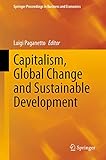Capitalism, Global Change and Sustainable Development [electronic resource] / edited by Luigi Paganetto.
Material type: TextSeries: Springer Proceedings in Business and EconomicsPublisher: Cham : Springer International Publishing : Imprint: Springer, 2020Edition: 1st ed. 2020Description: VI, 270 p. 60 illus., 36 illus. in color. online resourceContent type: text Media type: computer Carrier type: online resourceISBN: 9783030461430Subject(s): Economic policy | Economics | Sustainable development | Economic growth | Political Economy/Economic Systems | Sustainable Development | Economic GrowthAdditional physical formats: Printed edition:: No title; Printed edition:: No title; Printed edition:: No titleDDC classification: 338.9 LOC classification: HD87-87.55Online resources: Click here to access online
TextSeries: Springer Proceedings in Business and EconomicsPublisher: Cham : Springer International Publishing : Imprint: Springer, 2020Edition: 1st ed. 2020Description: VI, 270 p. 60 illus., 36 illus. in color. online resourceContent type: text Media type: computer Carrier type: online resourceISBN: 9783030461430Subject(s): Economic policy | Economics | Sustainable development | Economic growth | Political Economy/Economic Systems | Sustainable Development | Economic GrowthAdditional physical formats: Printed edition:: No title; Printed edition:: No title; Printed edition:: No titleDDC classification: 338.9 LOC classification: HD87-87.55Online resources: Click here to access online Slower World Growth or Global Recession with the Trade War? -- European solidarity as a way to face globalization and as an antidote against populism -- Global integration and economic growth in emerging countries: the case of BRICS and NEXT-11 -- 1948-2018: From the free-trade vision to protectionist attitudes -- GDP-Linked Bonds: A proposal worth looking into -- Strengthening disaster resilience: A micro-data perspective -- The European Globalisation Adjustment Fund: Easing the Pain from Trade? -- The Effect of Brexit on the UK Economy (so far) -- Climate Change: a new European Union approach is needed -- Relatedness, economic complexity and convergence across European regions -- Individual behavior and collective action: The path to Iceland’s financial collapse -- Towards a New Taxonomy of Manufacturing Countries -- Spatial-sectoral Skill Polarization: is South of Italy not Lost? -- Artificial intelligence, Its corporate use and how it will affect the future of work -- Is Globalization Sustainable?.
This book analyzes new forms of capitalism that are manifesting under the pressures of global transformation. By studying economic and environmental indicators in various parts of the world, it seeks to reconcile economic growth with environmental and social sustainability, which is an important issue in both developed and emerging economies. These indicators include the explosive development of digital technologies and new global value chains, which are reshaping economies and societies all over the world. The contributing authors also address the challenge of immigration, the sustainable development transformation, the ties between productivity and social rights, automation and global value chains, the energy transition, and innovation and sustainable growth.
